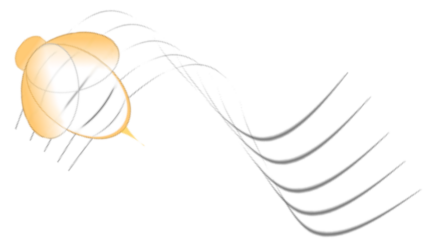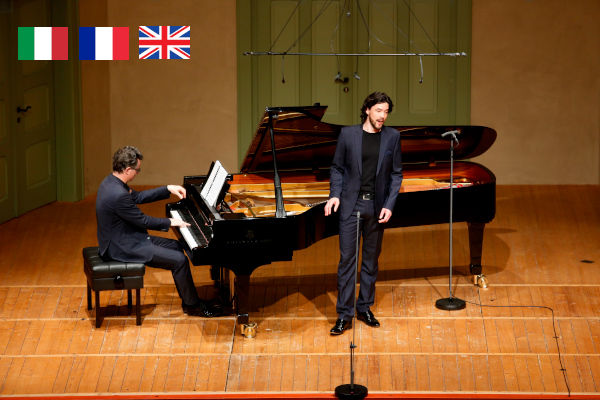Lungo il ruscello
di Susanne Krekel
André Schuen e Daniel Heide offrono una lettura s'incantevole e raffinata freschezza della Die schöne Müllerin di Schubert.
Hohenems, 1° maggio 2024 - Sebbene in questi casi si usi parlare di cicli, Die schöne Müllerin non ha nulla di circolare, anzi è un viaggio con un punto di partenza e una fine ben precisi. Racconta la storia d'amore di un giovane lungo un ruscello, la sua scoperta del mulino e della figlia del mugnaio, fino al tragico finale.
Questa sera, nell'ambito della Schubertiade di Hohenems - un festival diventato quasi mitico, che riunisce ogni anno i migliori interpreti di musica da camera e liederistica - il baritono André Schuen e il pianista Daniel Heide sono ospiti della splendida Sala Markus Sittikus.
Andrè Schuen ha uno strumento magnifico e sa come usarlo. Naturalmente è un eccellente attore, molto apprezzato dal pubblico dell'opera, e non ha bisogno di trucchi scenici. Canta semplicemente, raccontando la storia mentre canta, catturando e trasmettendo perfettamente il significato di ogni parola. I primi quattro Lieder sono eseguiti alla velocità di un ruscello e noi seguiamo il giovane mugnaio che, a sua volta, segue lo stesso ruscello, pieno di spirito e di ottimismo giovanile. Il pianoforte, che svolgerà il ruolo del corso d'acqua per tutto il ciclo, ci fa sentire le prime piccole increspature, poi la voce profonda e forte di Andrè Schuen invade la sala, un pizzico di bronzo nei forti, quasi velluto nero-blu nei piani e pianissimi, che a volte sono solo un soffio. Il suo legato è una meraviglia, la sua dizione perfetta; dal merletto alla roccia, tutti i materiali si cristallizzano in questo cnato. Non c'è bisogno di interpretare un personaggio: Daniel Heide e Andrè Schuen non sono i protagonisti, sono il mezzo attraverso cui passa l'arte di Schubert e Müller.
I Lieder che esprimono l'amore per la ragazza vanno dritti al cuore e almeno la parte femminile del pubblico deve chiedersi dove siano gli occhi di questa giovane donna, come possa optare per l'uomo in verde. I testi sono infatti piuttosto vaghi, e non c'è nulla che indichi che l'amore del giovane trovi una risposta positiva - è possibile che sia rimasto tutto perfettamente unilaterale. Il nostro mugnaio deve quindi affrontare la realtà: la bella mugnaia non è interessata a lui, che passa dalla rabbia alla rassegnazione - il tutto interpretato con verve e finezza. Ricordiamo infatti il cantante nel ruolo di Guglielmo nel 2020, con i suoi impressionanti tuoni di rabbia e i suoi accenti d'amore. Spesso il mugnaio si rivolge al ruscello, ed è il ruscello a cantare la ninna nanna finale. “Schlaf aus deine Freude, schlaf aus dein Leid, ... und der Himmel da oben, wie ist er so weit” (Riposa dalla tua gioia, riposa dal tuo dolore... e il cielo in alto, com'è vasto...). In quest'ultima strofa, Andrè Schuen e Daniel Heide spalancano questo cielo immenso, le ultime note che si stagliano dal pianoforte, e tutto è lì, consolazione, calma e infine pace.
Un lungo momento di silenzio, applausi, bravi, quattro bis, ma non si tocca un capolavoro, non ci sarà un bis. La realtà ci ha raggiunto e il momento, per quanto magico, non può essere trattenuto.
La voix du ruisseau
par Susanne Krekel
Hohenems, mai le premier, 2024 - Les recueils sont habituellement nommés des cycles, mais au moins La Belle Meunière n’a rien de circulaire, au contraire, c’est un voyage avec un point de départ bien précis, et une fin ditto. On y conte l’histoire d’amour d’un jeune meunier, le long d’un ruisseau, la découverte du moulin et de la fille du meunier, jusqu’à la fin tragique.
Ce soir, dans le cadre de la Schubertiade de Hohenems - festival désormais quasi mythique, où chaque année se côtoient les meilleurs interprètes de musique de chambre et du Lied - ce sont le baryton Andrè Schuen et Daniel Heide au piano qui nous donnent rende-vous dans la merveilleuse salle Markus Sittikus.
Andrè Schuen possède un instrument magnifique, et il sait s’en servir. Certes, c’est un excellent acteur, fort apprécié par les publics d’opéra, et il n’a pas besoin des artifices du jeu de scène. Il chante, tout simplement, il raconte en chantant, saisissant et transmettant parfaitement le sens de chaque mot. Les quatre premiers lieder sont rendus à la vitesse du ruisseau, et nous suivons le jeune meunier qui suit à son tour ce même ruisseau, plein d’entrain et d’optimisme juvénile. Le piano, qui t va tenir le rôle du ruisseau tout au long du cycle, laisse entendre les premières petites vaguelettes, ensuite la voix profonde et forte d’Andrè Schuen envahit la salle, un peu de laiton dans les forte, du velours d’un bleu presque noir dans les piano, et des pianissimi parfois juste un souffle - on en a le souffle coupé. Son legato est une merveille, sa diction est parfaite; de la dentelle au rocher, tous les matériaux se cristallisent dans ce chant. Ainsi, il est superflu de jouer le rôle d’un personnage : Daniel Heide et Andrè Schuen ne se posent pas en protagonistes, ils sont le médium par lequel passe l’art de Schubert et de Müller.
Les lieder qui expriment l’amour pour la jeune fille vont droit au cœur et au moins la partie féminine du public doit se demander où elle a ses yeux, cette demoiselle, et comment elle peut opter pour l’homme en vert. Les textes sont effectivement assez flous, rien n’indique que l’amour du jeune homme trouve un réponse positive - il est possible que tout cela soit resté parfaitement unilatéral. Donc, voilà, notre meunier doit se rendre à l’évidence : la belle meunière ne s’intéresse pas à lui et il passe de la colère à la résignation - tout cela interprété avec verve et finesse. On se souvient, en effet, du chanteur dans le rôle de Guglielmo en 2020, aux impressionnants tonnerres de colère et aux accents amoureux ronronnants. Souvent, le meunier s’adresse au ruisseau, c’est celui-ci qui chante la dernière berceuse. «Schlaf aus deine Freude, schlaf aus dein Leid, … und der Himmel da oben, wie ist er so weit.» (Repose-toi de ta joie, repose-toi de ta douleur … et le ciel, tout là-haut, comme il est donc vaste…) Dans ce dernier vers, Andrè Schuen et Daniel Heide étalent ce ciel si vaste, les dernières notes perlent du piano, et tout est là, consolation, calme, et finalement la paix.
Un long moment de silence, applaudissements, bravos, quatre rappels, mais on ne touche pas à un chef-d’œuvre, il n’y aura pas de bis. La réalité nous a rattrapé, et le moment, aussi magique soit-il, ne se laisse pas retenir.
Near the Brook
by Susanne Krekel
Hohenems, may the first 2024 - One usually calls the lied collections cycles, but at least Die schöne Müllerin is nothing less than circular, on the contrary, it’s a voyage with a well-defined beginning and end. It tells the unhappy love-story of a young miller, accompanied by a brook, from the discovery of a mill and the miller’s daughter, until the tragic end.
On this sunny May afternoon, in the context of the Hohenems Schubertiade - this almost mythical festival where the very best lied and chamber musicians come together - young baritone Andrè Schuen and Daniel Heide at the piano interpreted it in a marvelous location, the Markus Sittikus concert hall.
Andrè Schuen has a magnificent instrument and he knows how to use it. Although an excellent actor and much appreciated by the opera publics, his lied interpretation is devoid of acting tricks. He simply sings and tells his story, perfectly grasping and conveying the sense of each word.
The first four Lieder were delivered at the speed of the brook, and we were instantly following the young miller who himself followed the flowing brook. Daniel Heide played the first bars of the rolling accompaniment, and the deep strong voice of Andrè Schuen filled the hall, with a bit of brass in the forte, dark blue, almost black velvet when he sang more piano, and pianissimi that were just a breath — breath-taking indeed. His legato was a marvel, his diction perfect ; from lace to rock, every material crystallised in this singing. There really is no need for acting skills: Daniel Heide and Andrè Schuen didn’t pretend to be the protagonists of the piece, they were the very medium to give life to the art of Schubert and Müller.
The lieder expressing the love of the young girl went straight to the heart, and at least the female part of the public must have wondered about the lady’s eye-sight, and how she could possibly opt for the man in green. The texts, indeed, are somewhat ambiguous, nothing indicates clearly that the miller’s love has been rewarded, all of his jubilation might be based on pure imagination. Anyway, finally he has to accept that the lady isn’t really interested, and he moves from anger to resignation - interpreted with energy and finesse. We remembered the singer as Guglielmo in 2020 in Munich, and his impressive thundering rage and purring amorous accents. Often the miller addresses the brook, and the latter sings his last lullaby. ‟Schlaf aus deine Freude, schlaf aus dein Leid… und der Himmel da oben, wie ist er so weit.” (Rest from your joy, rest from your pain … and the sky up there, how vast is it.) With the last line, Daniel Heide and Andrè Schuen expanded the vastness of the sky above us, the last notes resounded from the piano, and everything was there, consolation, pause, and the final peace.
A long silence, applause, bravos, five curtains, but there was no encore - stands to reason. Reality had us back, and the moment, as magic as it might be, cannot be retained.


